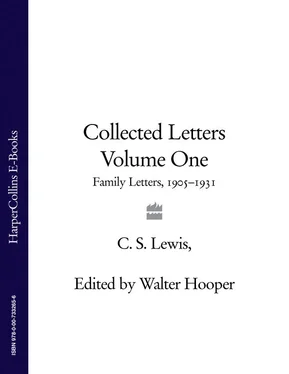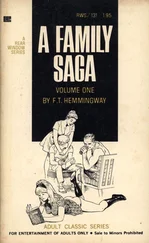By the way, I hear nothing about music or illustrations now! Eh? I hope that this can be accounted for by the fact that both are finished. I suppose the former has been performed in the Ulster Hall, by this time, and the latter exhibited–where? Here the sentence comes to a stop: for I have suddenly realized that there is no picture gallery in Belfast. It never occurred to me before what a disgrace that was. I notice, too, that you answer my questions about ‘doing’ and ‘reading’ but keep a modest silence about ‘thinking’. It is often difficult to tell, is not it? And seldom advisable: which makes me think about the hard question of truth. Is it always advisable to tell the truth? Certainly not, say I: sometimes actually criminal. And yet, useful as it is for everyday life, that doctrine will land one in sad sophistries if carried to its conclusion. What is your view?
The other day I was in Guildford (it is a glorious old English town with those houses that [get] bigger towards the top; a Norman castle; a street built up a preposterous hill; and beautiful environments) where I picked up a volume of Wm. Morris’s lyric poems in that same edition in which you have ‘The Wood at the Worlds end’. 60 So delighted was I with my purchase, that I have written up to the publisher for the same author’s ‘Sigurd the Volsung’: 61 which, as I need hardly tell you, is a narrative poem, dealing with Siegfried (=Sigurd) & Brünhilde, as described in the legends of Iceland, earlier than those of Germany. What is your opinion of Ainsworth? I see you are reading his ‘Old St. Pauls’. 62 I must confess I find him dreary–a faint echo of Scott, with all the latter’s faults of lengthiness and verbosity and not of his merits of lively narrative & carefully-welded plots.
When you talk about the difficulty of getting the necessary materials for one’s pursuits, I am thankful that, in my case, when the opportunity is at hand, the means–paper & pen–is easily found. Whereas you, unfortunately, need a piano or a box of paints and a block of drawing paper.
I hope there will be some relics of us left when we have settled that question of souteraines.
Yrs sincerely,
Jack Lewis
TO HIS FATHER (LP IV: 244-5):
[Gastons
13? November 1914]
My dear Papy,
I was glad to receive your letter this evening (Friday) as I was beginning to get anxious: and thought that I would write my reply at once while your words were still in my head. I must admit that my defence of Palmes was founded on a misconception of his plans–which is excusable, in as much as, if you saw the gentleman in the flesh, you would never imagine that he had the intelligence for such an idea.
After this magnanimous confession of my defeat, I cannot refrain from observing that there is no reply to my last step in the ‘Paradise-Inferno’ controversy. But as no further disputation is possible after my crushing and exhaustive demonstration, that is not much to be wondered at.
Although perhaps the occasion demands a graver view, I cannot restrain a smile when I think of the colonel staying at a first class hotel in ‘Haver’ and strutting about in his uniform like a musical comedy hero.
It seems a great pity this confirmation should occur when it does, thus cutting out at least a week of valuable time. Although fully sensible that it is of course of more importance than the work, yet if it could possibly be managed at some more convenient date in the near future, I should think it an advantage. I believe there is one held at Easter, which I might attend with less derangement of our plans. I would ask you to consider this point before mentioning the matter to Kirk. I am not quite clear from your letter as to what you propose to do. As I read it, three interpretations are admissable.
1 That you bring me home for the necessary time and send me back for the odd weeks.
2 That you add from Dec. 6th–Xmas on to the ordinary holidays.
3 That you have ordinary length holidays, only beginning on the 6th and ending earlier.
Of these alternatives, (a) is practicable enough, but necessitates a tiresome and expensive amount of extra travelling: (b) is agreeable, but wasteful of time and quite unthinkable. (c) is not only extremely alien from all our usual plans, but would also put Kirk to a great deal of trouble and annoyance. So that none of the three is really satisfactory. However, you will discuss the point in your next letter. If this Kodotta about cross channel boats goes on much longer, the matter will not rest in our hands.
Hoping for a continuance of health on your part, as well as an improvement in spirits, I am
your loving son,
Jack
TO ARTHUR GREEVES (W/LP IV: 282):
[Gastons
17 November 1914]
My dear Arthur,
Do you ever wake up in the morning and suddenly wonder why you have not bought such-and-such a book long ago, and then decided that life without it will be quite unbearable? I do frequently: the last attack was this morning à propos of Malory’s ‘Morte D’Arthur’, and I have just this moment written to Dent’s for it. I am drawing a bow at a venture and getting the Everyman two-shilling ‘Library’ edition. 63 What is it like, do you know? As for the book itself, I really can’t think why I have not got it before. It is really the English national epic, for Paradise Lost 64 is a purely literary poem, while it is the essence of an epic to be genuine folk-lore. Also, Malory was the Master from whom William Morriss copied the style of his prose Tales.
Which reminds me of your criticism of the ‘Well’. I quite see your point, and, of course, agree that the interests of the tale reach their climax in the great scene at the World’s End: my reply is that the interest of the journey home is of quite a different nature. It is pleasant to pick up all the familiar places and characters and see the same circumstances applied to the heroe’s new role of ‘Friend of the Well’. The Battle-piece at the end is very fine, and the ending, tho’, as was inevitable, conventional, leaves one in a pleasant, satisfied state of mind. The only part that I found really tedious was Roger’s historical survey of the Burg & the Scaur. In fact, Roger was only a lay-figure brought in to conduct the Ladye’s machinations with Ralph, and why he was not allowed to drop into oblivion when they were over, I cannot imagine.
How I run on! And yet, however many pages one may fill in a letter, it is only a tithe of what ten minutes conversation would cover: it is curious, too, how the thoughts that bubble up so freely when one meets a friend, seem to congeal on paper, when writing to him.
I wonder what you, who complain of loneliness when surrounded by a numerous family and wide circle of friends, would do if you could change places with me. Except my grinder and his wife, I think I have not spoken to a soul this week: not of course that I mind, much less complain; on the contrary, I find that the people whose society I prefer to my own are very few and far between. The only one of that class in Bookham, is still in the house, though they tell me she is up and about. 65 Of course, as they say at home, this solitude is a kind of egotism: and yet I don’t know that they are right. The usual idea is that if you don’t want to talk to people, you do so because you think they’re intellectually your inferiors. But its not a question of inferiority: if a man talks to me for an hour about golf, war & politics, I know that his mind is built on different lines from mine: but whether better or worse is not to the point.
My only regret at present is that I cannot see Co. Down in the snow: I am sure some of our favourite haunts look very fine. We have been deeply covered with it all week, and the pine wood near hear, with the white masses on ground and trees, forms a beautiful sight. One almost expects a ‘march of dwarfs’ to come dashing past! How I long to break away into a world where such things were true: this real, hard, dirty, Monday morning modern world stifles one. Progress in health and spirits and music! Write soon and give all your thoughts, actions, readings and any local gossip, for the benefit of
Читать дальше












